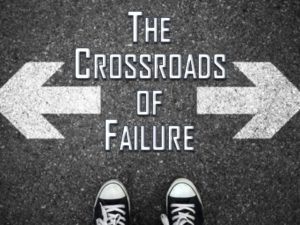 I give up.
I give up.
Normally those words do not come out of my mouth. It’s not that I’m blessed with superhuman tenacity—I just don’t like something to get the better of me. If I start it, I want to finish it.
Unfortunately, I had met my match. Several years ago, my father-in-law pulled into our yard with a two-seater go-cart in the back of his truck. The kids thought it was great. We deposited our share of combusted fuel into the ozone layer as we tore up the parking lot of the church next door.
Then the inevitable happened. The thing gave up the ghost. It took a decent amount of luck to get it started and a flat-out miracle to keep it running. So, drawing on my latent knowledge from a small engines 4-H class I took when I was in junior high, I tackled the project. After all, how difficult could it be to get a 5 HP engine running again?
I have to say that I was rather proud of myself for a while. I replaced the gaskets and cleaned out the gas tank and pickup tube. However, when I reassembled all the parts, I could not get the throttle cable to connect. It just didn’t fit. I’m still convinced that the neighbor swapped out some parts just to spite me. After multiple attempts over several months, I had to admit defeat. I threw the whole mess on the trailer and brought it back to my father-in-law.
All of us have failed in some area of our lives, often with disastrous results. Unlike a go-cart, we can’t just shove the mess in the shed for a while thinking “out of sight, out of mind.”
Maybe your failure was a sin. You can’t believe you did it, but you did.
What do you do now? Is there any hope? Is there life after failure?
I have good news for you. There is hope, and we learn that from a guy who sunk to the deepest level possible. You may have heard of him. His name is Peter, the disciple of Jesus.
Peter was an everyday country boy who became a fisherman, eventually transforming into one of the most venerated followers of Jesus. He had the privilege of walking on the water, seeing the transfiguration of Jesus, and, along with John, being the first of the disciples to see the empty tomb. Furthermore, he wrote two books of the Bible, and, according to history, died a martyr.
That looks like a pretty good resume to me. Would we say that he was a failure? Of course not.
But did he ever fail? Boy, did he ever, and in a way that we can hardly imagine.
Peter never thought he would fail. In fact, when Jesus predicted that he would deny Him three times before the rooster crowed the next morning, he vehemently disagreed. With a twinge of self-righteousness, he boasted that “Even if all are made to stumble because of You, I will never be made to stumble” (Matthew 26:33).
Me? Deny Jesus? No way!
A few hours later, however, he did the unthinkable. As he warmed himself by a fire outside of the kangaroo court that was unfairly trying Jesus, he emphatically denied three times that he had nothing to do with the accused.
But then the rooster crowed. Realizing what he had done, Peter “went out and wept bitterly” (Matthew 26:75).
Would we have done the same thing as Peter in that situation? We would like to think not, but remember, he didn’t think he would do it either. In spite of our noble intentions, we still may fail.
Every time we fail, we have a decision to make, and that decision will determine whether we live a defeated life or a vibrant life.
The decision is surprisingly easy. We only have two options.
Option #1: Regret and quit
That’s the easy one. Peter may have remembered the times he doubted Jesus while walking on the water or when he fell asleep in the garden and thought, “I’ve done it again. I’m nothing but a failure. I quit.”
That’s the path Judas took. He had betrayed Jesus the same night, but he went out and took his life. Judas allowed his failure to define himself permanently.
Fortunately, there is another option:
Option #2: Repent and restart
Repent is different than regret. With regret, we wish things were different. With repentance, we make them different.
Peter decided he would pick himself up and go after it again. Next time he would do better.
Peter made the right decision. Although we all know about his mistakes, we know him better for his successes. On the other hand, we define Judas by his failure.
Will we fail? Probably. But there is a difference between having a failure and being a failure.
I have a failure when I make a mistake. I am a failure when I quit.
That’s the difference. Judas quit, so he was a failure. Peter gathered up the pieces and tried again—this time with enviable faithfulness.
Don’t give up! You can do the same.



